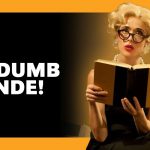The comedy genre has many great duos, and Mel Brooks and Gene Wilder were the kings of the parody genre. They satirized Westerns with Blazing Saddles, musicals with The Producers, and gothic horror with Young Frankenstein.
It was the connection between these two men that made their movies work. They were close friends who always came through for each other and made each other laugh.
Like and subscribe to Facts Verse for more on this unforgettable duo. Keep watching to learn why Mel Brooks and Gene Wilder had a genuinely unusual relationship and how they used it to make truly wonderful films.
Before They Were a Duo
Jerome Silberman was born on June 11, 1993, in Milwaukee. He began performing at a young age, inspired by other comedy greats such as Charlie Chaplin. Jerome studied at the Old Vic Theater School in Bristol, England in the 50s. He served in the army briefly before becoming a member of the Actors Studio in New York and adopting his stage name in 1961. His movie debut came in 1967 in the film Bonnie and Clyde.
Melvin Kaminsky was born on the 28th of June, 1926, in Brooklyn, New York. He served in WWII as a captain before becoming an entertainer. He began by playing drums in nightclubs before moving on to comedy. His film debut in Easy Come Easy Go canceled when star Jan Berry got in a car wreck. He became a writer for Your Shows of Shows in 1975 and Get Smart in 1965 before perfecting his brand of spoof movies.
Their Early Friendship
Mel Brooks met Gene Wilder when his wife Anne Bancroft was acting with him in the play Mother Courage. They immediately began teasing each other and getting close. Gene playing the role of The Chaplain, a complex part that was meant to be taken seriously. He asked why it kept getting laughs. Mel replied, “look in the mirror, blame it on God!”
They developed an immediate connection and began working together soon after that. Mel asked Gene to come to Fire Island to read a movie script he was working on. They went fishing and had dinner and talked about Springtime for Hitler, which would later become The Producers. He even offered Gene a part in it, which he graciously accepted. That began a lifetime connection that produced 3 comedy classics the world will never forget.
Gene asked in a PBS American Masters documentary if he thought that his first meeting with Mel was important. He burst into a furious fit of laughter. The interviewer asked him what was so funny, and he compared it to God meeting Moses.
This wasn’t the only time he praised his friend. He told The Los Angeles Times in 1990 that without him, he’d still be working as a temporary typist and selling toys at FAO Schwarz.
Like and subscribe to Facts Verse for more on the connection between the best Hollywood pairs of all time. Keep watching to learn why Mel Brooks and Gene Wilder had a truly unusual relationship that lasted until the end.
The Producers
Gene already promised the lead role of Leo Bloom before production on the comedy musical The Producers began. He was happy to have the part but wasn’t convinced it would get enough money to begin production. When it did, the 2 friends cried and hugged each other.
There also a bit of doubt that Gene would get approved by the film’s other lead, Zero Mostel. They arranged an audition, and Mel introduced them. Zero kissed Gene on the lips, and his manic energy compliments his costar’s more subdued nature.
This movie began the tradition of Mel and Gene working together. Like most of their collaborations, it features a brief voice cameo from Mel . You can hear him during the Springtime for Hitler musical number.
One of the most famous moments from the film was the blue blanket scene. Gene exhausted and asked his friend what to do for energy. He wanted chocolate, but Mel recommended black coffee. Gene ate 17 chocolate bars and drank a cup of black coffee, and his manic energy created a major moment in movie history.
The Producers turned out to be a bigger success than either of them expected. It earned Mel an Academy Award for Best Screenplay and Gene an Academy Award for Best Supporting Actor. The reviews and box office returns weren’t great, but everyone loved Gene’s performance. Keep watching to learn why Mel Brooks and Gene Wilder had a genuinely unusual relationship and how they used it to make truly wonderful films.
Blazing Saddles
Blazing Saddles was Mel’s satirical take on the Western genre. Pre-production didn’t start off well. Warner Brothers executives didn’t find it funny, but Mel got a better reaction when he took it to the studio’s employees.
Even taking the daring film to a studio was a gamble that eventually paid off. He promised to edit out offensive scenes but never did. One where Bart says “you’re sucking on my arm” even added back to the home video release.
Gene believed in the project more than the studio. He immediately asked to play alcoholic gunslinger Waco Kid, but his friend had other plans.
Mel wanted an older man for the part. He tried almost everyone he could find, including Dan Dailey, John Wayne, and Johnny Carson. An Oscar-winning up-and-commer known as Gig Young seemed like a perfect fit until shooting began.
The promising actor was also an alcoholic and was in withdrawal during his first morning. Mel called Gene in tears, and his friend came right away. He got the part he’d been wanting in the end. Keep watching to learn why Mel Brooks and Gene Wilder had a genuinely unusual relationship and how they used it to make truly wonderful films.
Reviews for Blazing Saddles mixed. Unlike most of his other films, reviewers didn’t feel Gene was giving his best performance. The Hollywood Reporter disagreed, and the film became a box office hit and comedy classic.
Young Frankenstein
1974’s Young Frankenstein is often considered one of the funniest movies of all time. It parodies James Whale movies and the horror genre as a whole, with a cast full of major names such as Marty Feldman, Teri Garr, and Peter Boyle.
Gene got the idea for the film in his bedroom one night. He wondered what would happen if the famous Dr. Frankenstein’s great-grandson were called back to his relative’s mansion.
Gene wanted Mel to direct the film at first, but the situation complicated. He wrote the film’s name on a legal pad one day, and Mel asked him about what he was working on. His friend intially dismissed his pitch, calling it “cute.”
That all changed when the actor got a call from his agent who was also representing Peter and Marty at the time and asked if he had any ideas for a movie with them in it. He said yes and showed a scene where the lead meets his servant Igor at Transylvania Station. He liked it and said Mel would be the perfect director.
Gene wasn’t sure if his friend would like the project but called him anyway to be sure. He said “I don’t know” at first but agreed the next day. Gene was looking for a hit after his last 2 movies, The Producers and The Twelve Chairs, only earned $50,000 each. He hoped this one would the cash cow he needed.
Gene wanted Mel to be involved in the film but not act in it. He knew his off-the-wall, fourth-wall-breaking friend would swing the film into a crazy comedy, which he didn’t want. Mel had no hurt feelings and was allowed to provide a few off-screen sounds for a werewolf and Victor Frankenstein.
The pair, and the crew at large, had such a wonderful time together that they had to stifle their on-set laughter. They’d put white handkerchiefs in their mouth. It took Gene 15 takes to stop his laughter during a take where he leads his costar up a set of stairs. Mel even allegedly warned anyone who laughed during the “Putting on the Ritz” scene would be arrested.
That moment, a musical number where the monster dances with his creator, arguably went on to be the most famous scene from the film. It was also one of the only times in their lives where Mel Brooks and Gene Wilder genuinely fought with each other.
They argued over whether or not to put it in the film for at least 20 minutes. Mel eventually realized that if his friend was willing to fight for it, it must be worth it. It turns out that it was one of the best decisions he ever made.
Young Frankenstein made Mel Brooks the last filmmaker on record to have 2 films in the top 5 of the box office for a whole year. It earned $86.3 million, and Blazing Saddles earned $119.6 million. It even topped major hits that came out the same year such as The Godfather Part II and The Longest Yard.
Gene’s Death
Gene Wilder died in his home on August 29, 2016, at the age of 83. His nephew Jordan Walker-Pearlman confirmed that the cause of death was complications of Alzheimer’s. They chose to hide how serious his condition had become until then to keep his fans from worrying.
Mel admits his friend knew he was sick and expected that he would go but was sent reeling when the news came. He couldn’t imagine not being able to call him up on the phone as they had done so often before.
Gene’s Tweeted a sentimental message calling him one of the greatest talents of our time. He also said that he blessed every film they did with his magic and blessed him with their friendship.
Other comedy geniuses and major actors offered their condolences on social media as well. Jim Carey said, “if there’s a heaven, he has a golden ticket.” Russel Crowe said he’d seen Blazing Saddles 7 times and called him a genius.
Wilder is survived by his wife, Karen Boyer, and his daughter Katherine. Mel also outlived him and is currently 96.
Who’s your favorite comedy duo in Hollywood? Let us know in the comments below. Like and subscribe to Facts Verse for more on the hilarious and often tragic details behind the lives of the best frequent collaborators in film.


